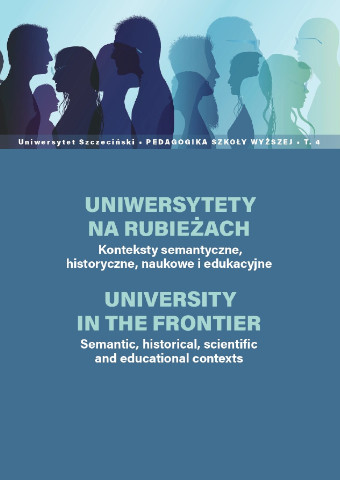
ISBN: 978-83-7972-559-5
ISBN (online): 978-83-7972-560-1
ISSN: 2083-4381
OAI


Lista wydań /
T. 4
Beyond the lonely university – how universities can be alone together
| Autorzy: |
Julian
Stern

Bishop Grosseteste University |
| Słowa kluczowe: | profession lonely solitude loneliness community university education |
| Data publikacji całości: | 2022 |
| Liczba stron: | 6 (275-280) |
Abstrakt
Universities can ‘sit apart’ from the rest of society. They can be ‘ivory towers’, protected and isolated from the outside world. This can be valuable. It is good to have somewhere to go, where people can consider the deepest issues, where they can contemplate matters that others may think worthless or insignificant, where there can keep their heads in books to study long-dead and distant writers, where they can try – and sometimes fail, and sometimes manage – to unlock the mysteries of the universe. However, at times – and now is one of these times, at least in the UK – the separation of universities is accompanied by a rejection by people outside higher education. The separation, the ‘sitting apart’, can therefore – for all its advantages – lead universities (or those in universities) to experience loneliness. Loneliness is an emotion that, currently, has anything up to three dimensions: a separation from others, a sense of rejection by others, and also a sense of responsibility for that rejection – a sense of guilt or shame for being alone.
In contrast, we can think of universities being embedded in society – growing from the local society and feeding back into the rest of society. Universities originally grew up to train people for professions – to profess, quite literally, in religious communities, and to join other professions such as medicine and the law. The ‘ivory tower’ view of universities only emerged in the nineteenth and twentieth centuries. This was at the time, ironically, when higher education was in a period of rapid expansion and was attempting to retain (or was insulted for trying to retain) its medieval mystique.
Education departments in modern universities are all-too-often looked down upon within the academy, for their ‘embeddedness’ in schools and other extra-mural professional contexts. Yet this is precisely how and why universities developed over the last millennium. The two images of universities – as apart and as embedded – live alongside each other. My hope is that universities can be in healthy solitude at times, and not suffer from loneliness (i.e., at least, not feel shame or guilt for their solitude), and universities can be embedded in wider society, and retain their educational purpose. If they can, in such ways, be both alone and together, they can live healthily, alone and together.
Pobierz plik
Plik artykułu
Bibliografia
| 1. | Benjamin, W. (1999 [1927–1939]). The Arcades Project. Cambridge, Massachusetts: Belknap Press. |
| 2. | Macmurray, J. (2004). John Macmurray: Selected Philosophical Writings, Edited and Introduced by Esther McIntosh. Exeter: Imprint Academic. |
| 3. | Stern, L.J. (2009). The Spirit of the School. London: Continuum. |
| 4. | Stern, L.J. (2014). Loneliness and Solitude in Education: How to Value Individuality and Create an Enstatic School. Oxford: Peter Lang. |
| 5. | Stern, L.J. (2016). Virtuous Educational Research: Conversations on Ethical Practice. Oxford: Peter Lang. |
| 6. | Stern, L.J. (2018). What Does Autonomy in Universities Look Like? Pedagogika Szkoły Wyższej, 24, 33–39. |
| 7. | Stern, L.J. (2018b). Curiosity Killed the SAT: The Role of Research in Redirecting Performativity in Initial Teacher Education. Research in Education, 1–15. |
| 8. | Stern, L.J. (2018c). A Philosophy of Schooling: Care and Curiosity in Community. London: Palgrave. |
| 9. | Stern, L.J. (2020). The Real Reason Neoliberalism Became Extinct: A Curious Educational History of 2020. Forum: For Promoting 3–19 Comprehensive Education, 3 (62), 477–487. |
| 10. | Stern, L.J., Sink, C.A., Wałejko, M., Wong, P.H. (red.) (2022). The Bloomsbury Handbook of Solitude, Silence and Loneliness. London: Bloomsbury. |
| 11. | Stern, L.J., Wałejko, M.J. (2020). Solitude and Self-Realisation in Education. Journal of Philosophy of Education, 54 (1), 107–123. |
| 12. | Watters, W.R. (1974). The Loneliness of Being Jewish. Journal of Ecumenical Studies, 11 (1), 120–126. |